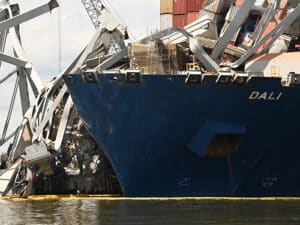
IKEA and CMA CGM in pioneering biofuel project
Written by Nick Blenkey
CMA CGM containership. Image copyright CMA CGM
Name brand shippers looking to lower the overall carbon footprint of their products are adding impetus to efforts to decarbonize shipping. One shipper leading the way along this path is IKEA Transport & Logistics. It is joining forces with CMA CGM, the Port of Rotterdam and an initiative called the GoodShipping Program to test and scale up the use of sustainable low-carbon biofuel oil in the marine industry.
A landmark bunkering of a CMA CGM containership with the biofuel is set to take place in Rotterdam on March 19.
The sustainable marine biofuel has been developed by Netherlands-based GoodFuels after undergoing three years of intensive testing with marine engine manufacturers. The second generation bio-fuel oil is completely derived from forest residues and waste oil products, and is expected to deliver a 80-90% “well-to-propeller” CO2 reduction compared with fossil equivalents, and to virtually eliminate sulfur oxide (SOx) emissions — all without any requirement for engine modifications.
The trial takes place as shipowners face the challenges of complying with the IMO 2020 sufur cap and prepare for impending Greenhouse Gas (GHG) reduction requirements, that include a target of reducing the average carbon intensity of shipping – the amount of carbon emitted for each unit of transport – by at least 40% by 2030, and 70% by 2050.
“Through our pilot we want to show that the means for decarbonization in terms of alternative fuels are available,” says Elisabeth Munck af Rosenschöld, Head of Sustainability, IKEA Global Transport & Logistics Services. “We have a responsibility to do our part to reduce the impact of our ocean freight. Through our participation we send a signal to our customers and the ocean industry on our commitment to decarbonise. Only through collaboration can we achieve rapid, necessary change. With a successful pilot completed, our intention is to put the equivalent of at least all our containers out of Rotterdam on biofuel.”
“In a few days, we will be testing second-generation biofuel in one of CMA CGM’s vessels for the first time,” says Xavier Leclercq, Vice President, CMA Ships. “Having an HFO-equivalent solution in biofuel oil available with no engineering or operational changes required to our vessel offers a safe, manageable and innovative opportunity to facilitate shipping’s wider transition to new fuel solutions.”
“It’s clear that shippers play an important role in decarbonizing the industry,” says Port of Rotterdam CEO Allard Castelein. “This bunkering shows that decarbonization of sea trade is well achievable. In Rotterdam the necessary infrastructure is available. Besides that, to support these kind of initiatives, we have just started a four year period during which we have EUR 5 million to spend on stimulating specific projects to reduce carbon dioxide emissions from the global shipping industry.
Dirk Kronemeijer, CEO, The GoodShipping Program notes that its aim has always been not only to reduce carbon emissions from shipping, but to show that the means to accelerate the energy transition are already available for the sector to grasp.
GoodFuels says that its sustainable marine biofuels are “drop-in” fuels, functionally equivalent to petroleum-derived marine fuels with no modification required to engines or the fuel infrastructure. The fuels are 100% based on waste and residues with the biofuel being used for the CMA CGM refueling consists of waste used cooking oil and forest residues – both of which have been sourced and processed in Europe.




